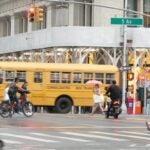Posts tagged with 'vulnerable communities'
New research from WRI’s Electric School Bus Initiative and Carleton University shows that the U.S. would see an estimated $1.6 billion in health and climate benefits every year by using electric school buses. This estimate accounts for the cost to society of using diesel-burning school buses ...

The Miami-Dade County Public Schools district (M-DCPS) has plans to reach 100% clean energy by 2030. Electric school buses (ESBs) form a centerpiece of its broader sustainability strategy. As the seventh-most populous county in the U.S. and the fourth-largest public ...

Much of Europe sweltered in August 2025 as a heat dome spread across the continent, pushing peak afternoon temperatures to over 40 degrees C (104 degrees F) in France and Spain. Meanwhile, parts of Greece, Turkey and Albania battled historic and devastating ...

Steve Easterday would start and end the school year with the windows open. In the fall and spring, when the weather turned temperate in central Tennessee, his passengers – Putnam County School students of all ages – would slide down ...

Despite accounting for less than 3% of global terrestrial area, cities have had an outsized impact on our approach to planetary boundaries, affecting biodiversity and consumption of materials and energy. Studies show that cities have become responsible for 78% of carbon emissions, ...

In the heart of Nairobi’s Mathare slums, a quiet but powerful revolution is growing – one plant at a time. Teenage mothers, often marginalized and overlooked, are transforming their lives and their community through urban farming and organizing. Their efforts ...

Extreme weather events like floods and droughts are becoming more frequent and intense around the globe, disrupting communities and the infrastructure they rely on. In 2024 alone, the world endured 58 disasters that wreaked over a billion dollars in damages each. Yet ...

Upset with adults for not taking the climate crisis seriously and inspired by the youth climate strikes around the globe, students in Arizona found a way to get adults to listen. In 2019, they founded the Arizona Youth Climate Coalition ...

Africa’s cities are both among the most rapidly growing in the world and the most underserved by transport infrastructure. The African Development Bank estimates an annual infrastructure investment gap of $100 billion even as Africa’s urban population is projected to double by ...

Sprawl is a known and widespread challenge for rapidly growing cities across the world. Unplanned, inefficient development encroaches on natural resources and ecosystems, often reaching far beyond established transit networks. Residents of sprawling urban areas often face socioeconomic vulnerabilities and ...

The evidence is clear: the climate crisis is not gender neutral. Climate change is a threat multiplier. As instability intensifies, women are increasingly subject to conflict and its externalities, including gender-based violence and persecution. And because women are disproportionately represented ...

What does it take for cities to create a true systems change that creates a holistic, positive shift of the entire urban system? Finding and celebrating examples of this feat is at the heart of the WRI Ross Center Prize for Cities. Since ...

For the 21 million residents of Lagos, Nigeria, climate change is not a distant concept — it is a current reality. Over the past decade, the city has experienced devastating floods, exacerbated by the loss of over half of its wetlands ...

Cities are at the forefront of climate impacts, and city governments are key actors in unlocking action to build urban resilience and reduce greenhouse gas emissions. In recent years, the number of cities and regions committing to climate action and ...

For more than 20 years, WRI has identified annual “stories to watch.” These are the year’s moments, issues and decisions that we believe will shape the future trajectory of the world. In the past, we’ve highlighted things like dangerous heat in cities, ...




























